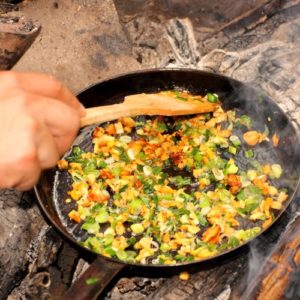
Cooking in the backwoods can be quite the task. Consider bringing a stove incase it rains and you’re unable to build a fire.
Now that summer is finally (almost) here, many Boulder culinary school students are planning on packing up their camping gear and heading out into the woods. With all the gorgeous mountains and trails, you’re going to need the right gear and food to keep you fueled on your adventures. Here are some tips for cooking in the wild:
Bring a stove
While cooking over a bonfire can be a blast, it’s also unpredictable. You have to pay close attention to the food while it’s cooking because the temperature of the fire changes frequently. Plus, you never know whether it’s going to rain, making all your potential firewood and kindling wet, and a bonfire almost impossible. We suggest you bring a stove. There are many reliable models available, from small propane options that can sit on the back of a truck bed to MSR liquid fuel camp stoves. You can even bring a charcoal grill on your excursion, if you’re planning on driving the whole way. Just be sure to check in with the local parks service or campground staff to learn what the area fire danger is and what cooking equipment you are allowed to have. And always put out any flames once you are done using them. You don’t want to be the catalyst for a forest fire.
Think dry goods
Unless you’re going camping in an RV, you’re not likely to have access to any way of keeping your food cold. Any perishable items that you take on your trip should be eaten right away or they will go bad. Even fresh fruits and vegetables should be eaten the first night or two as they will lose flavor and rot in the Colorado heat. This is why it’s important to bring dry goods. Items like noodles, rice and beans are great for camping because they will keep for your entire trip (so long as they’re uncooked) and they are full of carbohydrates, which will provide long-lasting energy. If you’re on the go for your camping adventure, throw some dried beans in a water bottle to hydrate as you travel. They’ll be ready to be heated or added to a quick soup by the time you get to your campsite.
Pack light
If you’re going camping with a group of friends, you may be the only culinary student in the bunch. This means that your food priorities (think spices, lots of options for meals) may be different than your friends’. This may lead you to carrying a much bigger, heavier bag than the rest of your companions. At the end of the day when you go to cook, you may whip out a cast iron pot to sizzle your porterhouse steak in while your compadres fork cold ravioli from a can. Yes, you’re eating well, but your back and legs are also probably also hurting. You can eat well on trail without bringing your entire spice cabinet and a lot of extra food. Plan your meals ahead of time and measure out enough of each necessary ingredient to get you through the trip. This way you’re not carrying excess weight.

